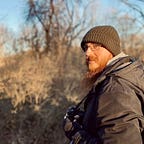Postcard from an Alpine Lake
In an effort to escape the near-100-degree heat down on the plains, my hiking companion and I retreated early in the day to the alpine woods of the Indian Peaks, knowing the particular trail we had in mind followed a river cooled by the season’s snowmelt. This would also be my first time up to Lost Lake in the summer months, as the crowds typically keep me away this time of year, so I was anxious to see what this favorite lake of mine looked like in its summer dress.
All along this secluded trail, the firs were crowned in purple cones, the spruce tips a vibrant green like fireflies dancing along the wood, with the aspens filling in the gray patches of winter I’m more accustomed to along the mountainside. The river that brought us here flowed with earthen might, and the highlight of our particular adventure today was perhaps the extended time of meditation and reflection we took to behold the majesty of a waterfall in peak snowmelt. Part of myself remained beside that waterfall for the remainder of the hike.
Once restless enough, we continued up the remaining half-mile to the lake, stopping at another smaller fall along the way to cool off and to search for mushrooms and flowers. It was captivating to see how rapidly the biomes change at this elevation. As we neared the top, the soil was noticeable more rich and moist, as was the air as testified by the moss on the fields of rock and stone. The spruce tips characterizing the wood down below were now absent only 800 feet higher, with very little pollen hazing the air at this height.
As we neared the top, we were taunted by the endless mounds of moose scat, hoping to get a glimpse of one from a safe distance, but they remained the elusive forest spirits that they are.
After one final push up a steeper passage, we finally crested the top, and oblivious to where the trail splintered off, we bushwhacked to the south side of Lost Lake which in the full sun of the afternoon mirrored the pines into the eternity of the alpine sky, which couldn’t have been clearer that day, allowing us an unobscured view of the nearby tundra of Devil’s Thumb pass. If you have never beheld a tundra so close and clear, I truly wonder if Muir meant that the tundra was calling rather than the mountains. The alien and enchanting nature of a tundra always holds a part of me hostage during a hike this high up, almost as if I may wander off in its direction as a thrall at any moment.
There are a few boulders left by glaciers that dot the perimeter of Lost Lake, and the one we found gave as cozy a reprieve as any leather-bound chair, sitting us just far out enough from the shore to give us the illusion of floating along in a canoe, with the crystalline waves lapping against the side of the rock as we took in the sublime and overwhelming landscape of a rocky mountain alpine wilderness.
It was a perfect day. The trout lept and sipped from the surface all around us, adding to the festive feeling of living this life raw and unmediated, if even for one fleeting day in this strange and compromised life we have.
Then I chuckled to myself, remembering only two months ago I was lying down in the middle of this very lake, watching the sky from a hammock of ice.
Thus, the year turns.
Jameson Foster is an ecomusicologist and wilderness writer at University of Colorado-Boulder. You can find more of his work here on Medium or on the Dirty Musicology podcast.
